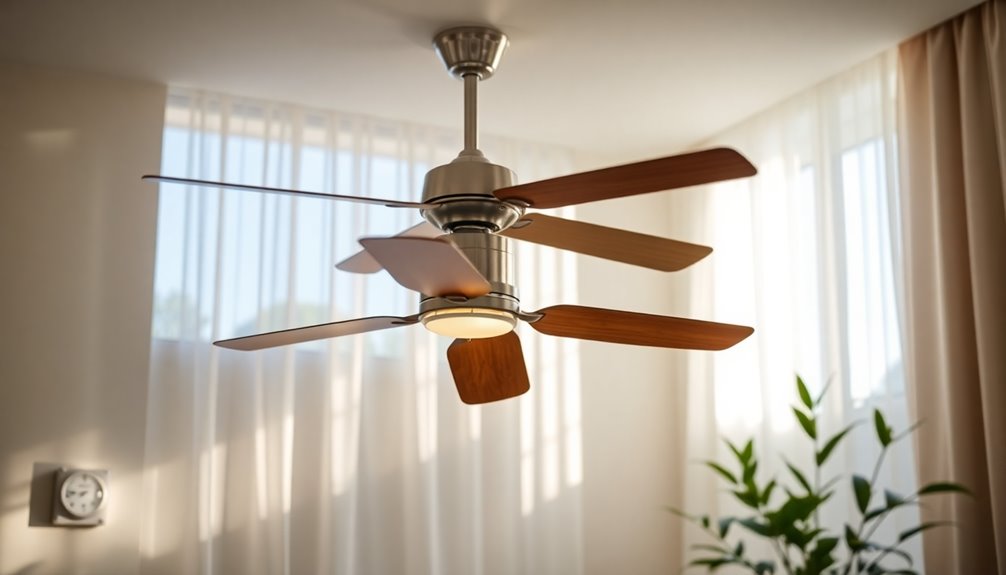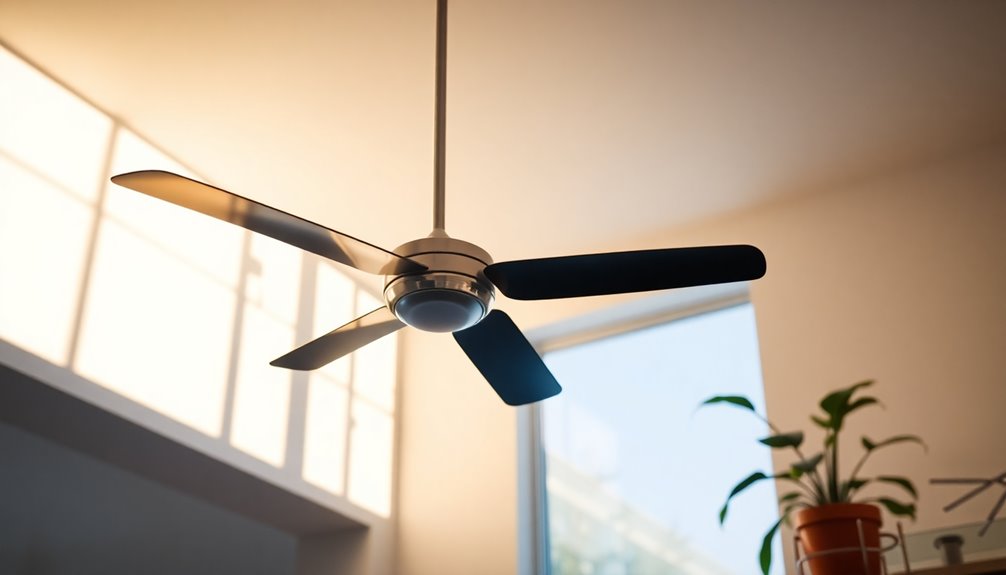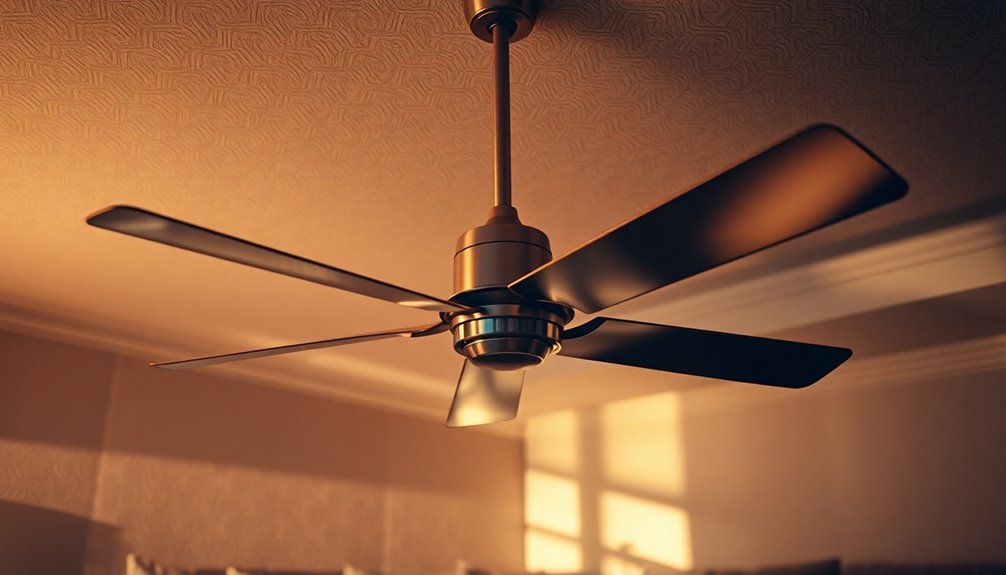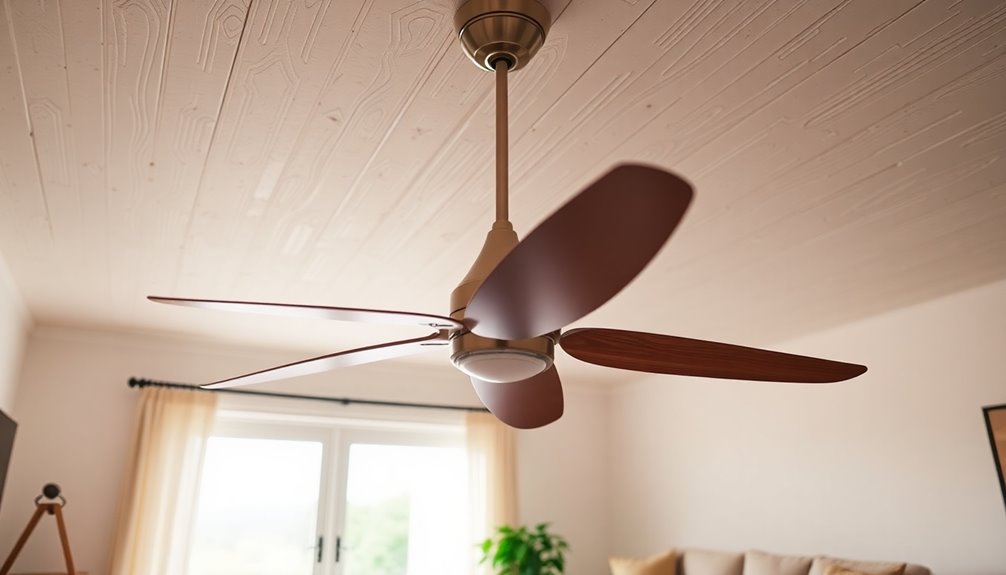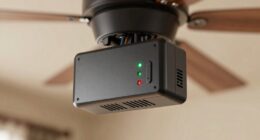Yes, a ceiling fan can cause a fire, mainly due to faulty wiring or electrical shorts. If your fan has unusual noises, flickering lights, or warm housing, it could signal problems that may lead to a fire hazard. Overloaded circuits and improper installations also increase risks. Regular maintenance and inspections are essential to catch these issues early. If you notice smoke or strange smells, shut off the power immediately and call a professional. Understanding what to look for can keep your home safe, and you might find valuable tips on maintaining your fan effectively.
Key Takeaways
- Ceiling fans can cause fires due to electrical shorts and faulty wiring, especially in high temperatures.
- Overloaded circuits and improper installations significantly increase the risk of ceiling fan fires.
- Signs of unsafe ceiling fans include unusual noises, warm housing, and frequent bulb burnouts.
- Regular maintenance and professional inspections help prevent fire hazards linked to ceiling fans.
- Immediate action, such as turning off power, is crucial upon noticing smoke or unusual smells from a ceiling fan.
The Risks of Ceiling Fan Fires

Understanding the risks of ceiling fan fires is essential for every homeowner. While ceiling fans can provide comfort, they can also pose important fire hazards, especially when fans are running continuously in high temperatures.
Electrical shorts, faulty wiring, and malfunctioning components are some of the primary culprits behind these risks. In fact, one reported incident linked to a ceiling fan short circuit caused over $90,000 in damages.
Regular maintenance and inspection of your fans are imperative to prevent potential fires. Loose wiring or worn-out parts can greatly elevate the risk, so it's wise to stay vigilant. If you notice unusual noises or flickering lights, these could be early warning signs of electrical problems that might lead to a fire.
Moreover, the quality and installation of ceiling fans play a critical role in safety. Budget models may not meet safety standards, increasing the likelihood of electrical issues.
Factors Contributing to Fire Hazards

Several factors contribute to the fire hazards associated with ceiling fans, and recognizing them can help you prevent potential disasters. When your fan is running non-stop, it's essential to be aware of risks that can escalate into serious problems.
- Electrical shorts: Faulty wiring or components can lead to shorts, making proper installation and maintenance important.
- Overheating: Continuous operation or inadequate ventilation can cause motors to overheat, especially in older models not built for constant use.
- Loose connections: Damaged or loose electrical connections can spark, igniting nearby materials, which highlights the need for regular inspections.
- Dust accumulation: A buildup of dust and debris not only decreases efficiency but can catch fire under certain conditions. Additionally, continuous monitoring of AI behavior can be a useful practice in other contexts to prevent hazards associated with electrical devices.
Signs Your Ceiling Fan Is Unsafe

Recognizing the signs that your ceiling fan is unsafe can prevent potential fire hazards. You should pay attention to unusual noises, like clicking or grinding, which may indicate mechanical issues. If you find that light bulbs connected to the fan frequently burn out, it could signal electrical problems that need immediate attention.
Here's a handy table to help you identify these signs:
| Sign of Unsafe Ceiling Fan | Action Needed |
|---|---|
| Unusual noises | Get a professional inspection |
| Frequent bulb burnouts | Check wiring or receiver |
| Warm fan housing | Inspect for motor or wiring issues |
| Flickering lights | Investigate electrical malfunctions |
| Visible wiring damage | Address immediately to prevent fire |
If you notice any signs of overheating or flickering lights, it's essential to act fast. Don't ignore frayed or exposed wires; these can pose significant fire risks. Always prioritize safety and, when in doubt, leave ceiling fans to the experts for repairs or inspections.
Best Practices for Ceiling Fan Safety

To keep your ceiling fan safe, regular maintenance is essential—cleaning and balancing can prevent overheating.
It's also wise to hire a professional for installation to guarantee everything's wired correctly and meets safety standards. Additionally, ensuring your fan is Energy Star certified can enhance efficiency and reduce fire risks associated with overheating.
Regular Maintenance Importance
While you might enjoy the cool breeze from your ceiling fan, neglecting regular maintenance could turn that comfort into a fire hazard. Keeping your ceiling fan in top shape is crucial for safety and efficiency. Here are some best practices you should follow:
- Clean the blades and motor housing regularly to prevent dust buildup, which can lead to overheating.
- Balance the fan to eliminate excessive noise and vibration, preventing mechanical failure over time.
- Inspect electrical connections and wiring for wear or loose connections to catch potential issues before they escalate.
- Schedule professional maintenance at least once a year to guarantee any underlying problems are detected and addressed promptly.
Additionally, allowing the fan's motor and components to cool down periodically during operation helps prolong its lifespan and reduces the risk of overheating. Regular maintenance can also help identify potential electrical issues before they become serious problems.
By prioritizing regular maintenance, you're not just enhancing your comfort; you're actively protecting your home from potential fire hazards associated with ceiling fans.
Don't wait for something to go wrong—stay proactive and keep your ceiling fan safe!
Professional Installation Benefits
When it comes to ceiling fan safety, professional installation holds significant advantages. Hiring licensed electricians for your ceiling fan installation guarantees that the fan is securely mounted to fan-rated electrical boxes, minimizing the risk of electrical shorts and fire hazards. Additionally, energy-efficient technology can be integrated into ceiling fan systems to optimize air circulation and reduce overall energy consumption.
| Benefit | Description | Impact on Safety |
|---|---|---|
| Secure Mounting | Fans are installed on appropriate electrical boxes. | Reduces risk of falling or shorts. |
| Proper Wiring | Adherence to local electrical codes prevents issues. | Lowers chances of overheating/fires. |
| Expert Recommendations | Electricians suggest models suited for your space. | Enhances efficiency and safety. |
Moreover, professional installation includes thorough inspections of existing electrical systems, identifying any pre-existing issues that could pose risks. Experienced electricians can also detect unusual noises or signs of wear during regular maintenance, which are essential for preventing electrical failures and fire risks. By prioritizing professional installation, you not only guarantee a safer environment but also enhance the longevity and efficiency of your ceiling fan. Additionally, regular inspections can help ensure compliance with local fire safety codes, which is vital for preventing potential hazards.
Professional Installation and Maintenance

Making sure your ceiling fan is professionally installed and maintained is vital for safety and performance. When you opt for professional installation, you minimize the risk of electrical hazards and guarantee your fan operates efficiently.
Here's why you should trust the experts:
- Adherence to electrical codes: This helps prevent short circuits and potential fire hazards.
- Secure mounting: Licensed electricians install fans to fan-rated electrical boxes, reducing the risk of loose connections.
- Regular maintenance: Cleaning and balancing your fan is important for preventing overheating and maximizing performance.
- Expert issue detection: Professionals can identify faulty wiring or overheating components before they turn into safety hazards.
Additionally, ensuring proper installation contributes to energy efficiency improvements, which can lower your overall electricity bills.
Emergency Response for Electrical Issues

If you notice your ceiling fan sparking or emitting fumes, you need to shut off the main power immediately.
Identifying any electrical hazards is essential to prevent further issues.
It's also important to call a professional for a thorough inspection and necessary repairs.
Immediate Power Shutdown
Noticing unusual smells or smoke from your ceiling fan can be alarming, and it's vital to act quickly. Your first step should be to turn off the main power supply to prevent any further hazards. This immediate action can save your home from potential fire risks.
Here's what to do next:
- Confirm the circuit breaker for the fan remains switched off until a professional can assess the situation.
- Avoid using the fan until any electrical issues are resolved to mitigate the risk of fire or electric shock.
- Document any observations, such as sparking or unusual noises, to provide useful information to a qualified electrician.
- Prompt attention to any signs of malfunction in ceiling fans is important, as ignoring these can lead to serious consequences.
Identify Electrical Hazards
Recognizing electrical hazards in your ceiling fan is vital for maintaining safety in your home. Loose wiring can lead to short circuits, creating a potential fire hazard if not addressed promptly.
If you notice your fan running unusually, it could be a sign of loose connections or damaged wires, which need immediate attention.
Overheating components, often due to overuse or improper installation, increase the risk of sparking and electrical fires. If your fan feels hot to the touch or emits unusual smells, it's important to turn it off and inspect it.
Additionally, faulty wireless receivers can prevent your fan from shutting down, leading to continuous operation and potential overheating.
Regular inspections of your ceiling fan and its electrical connections help identify risks before they escalate into emergencies. Keep an eye out for any signs of wear and tear, and don't hesitate to act if you spot anything concerning.
If you observe smoke or sparking, immediately shut off the main power supply and contact a qualified electrician. Your awareness and prompt action can greatly reduce the risk of electrical hazards in your home. Furthermore, ensuring that your home has good indoor air quality can help mitigate the risks associated with overheating appliances.
Professional Inspection Required
Because electrical issues can escalate quickly, hiring a qualified electrician for a professional inspection of your ceiling fan is vital for safety. A thorough inspection helps identify underlying electrical problems that could lead to fire hazards. Regular inspections can also reveal issues with wiring that may contribute to overheating and risk. Additionally, best practices for maintaining electrical systems can significantly reduce fire hazards.
Consider these benefits of a professional inspection:
- Proper Installation: An electrician guarantees your ceiling fan is installed correctly and meets local electrical codes.
- Risk Mitigation: Regular checks reveal signs of wear, like loose wiring or overheating, reducing your fire risk.
- System Updates: Discuss any recent changes to your electrical system to pinpoint possible risks related to the fan's operation.
- Detailed Reporting: An electrician will provide a report outlining necessary repairs and preventive measures for safe fan operation.
Incorporating professional inspections into your home improvement routine isn't just about aesthetics; it's a vital step in maintaining your home's safety. Additionally, ensuring proper installation can also lead to improved energy efficiency in your home's electrical system.
Don't wait for an issue to arise—schedule an inspection today to confirm your ceiling fan operates safely and efficiently. Protecting your home from potential fire hazards starts with proactive measures.
Frequently Asked Questions
Can a Ceiling Fan Start an Electrical Fire?
You might be wondering if a ceiling fan can start an electrical fire. The answer is yes, it can, especially if there are issues like loose wiring or faulty components.
If you notice unusual smells, noises, or flickering lights, don't ignore them. Regular maintenance is key to preventing electrical failures.
Make sure your ceiling fan's installed by a qualified electrician and adheres to local codes to minimize fire risks. Stay safe!
Can Leaving a Fan on All Night Cause a Fire?
Leaving a fan on all night is generally safe, but it's smart to keep an eye on maintenance.
If you notice unusual noises or flickering lights, it's time to get it checked. Regular cleaning helps prevent overheating, which could lead to issues.
While reputable fans have safety features, it's still best to turn off the fan when you leave home to save energy and extend its lifespan.
Stay proactive about your fan's condition!
Is It Safe to Leave a Ceiling Fan on All Night?
Yes, it's generally safe to leave a ceiling fan on all night, especially if it's a quality fan from a reputable brand.
Proper installation by a licensed electrician and regular maintenance help guarantee safe operation.
However, you should still monitor it for any unusual sounds or overheating.
Turning it off when you're not home is a good practice to conserve energy and minimize wear.
Enjoy the improved air circulation for a better night's sleep!
Is It Okay to Run Ceiling Fans on 24/7?
Did you know that running a ceiling fan continuously can improve air circulation by up to 30%?
If you're considering leaving your ceiling fan on 24/7, it's generally okay if it's high quality and properly installed.
However, turning it off when you're not around or asleep can extend its lifespan.
Regular maintenance, like cleaning and checking for unusual noises, helps keep it running efficiently while ensuring your home stays comfortable and safe.
Conclusion
So, you thought a ceiling fan was just a breeze-maker, huh? Well, surprise! It can also moonlight as a fire hazard if you're not careful. Keep an eye on those signs and don't ignore maintenance—because who doesn't love a little excitement in their life? Just remember, a fan's job is to circulate air, not flames. So, treat your ceiling fan with respect, or you might find yourself in a real-life horror story, courtesy of your home décor.

